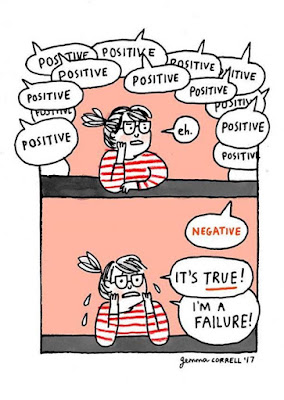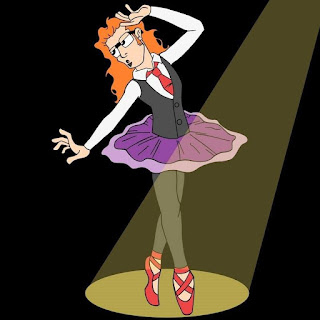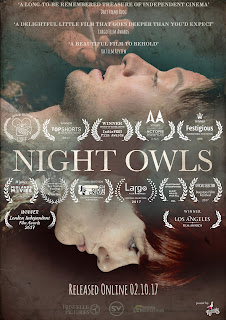Losing my Muchness (and getting it back)
 |
| Very relatable artwork by Gemma Correll! |
I'm always striving to blog more often, and if something big comes along that I can learn from, then that gives me even more of a reason to write. Unfortunately there's only been one thing on my mind this month (apart from Songbird) and it's not a fun subject, but I do think I have some advice from anyone who's been through similar. So here goes...
When one first starts making films, it's purely a creative form of expression: you get your friends involved, you shoot & edit it yourself, and you only have yourself to please. When you go to film school, your skill and your films become something to be marked, to be rated, but it's still only a means to an ends, so it doesn't affect your mindset too deeply. But after that, whenever you make a film, you need to release it into the world, and make yourself known to people - and everyone has an opinion, a criticism, a judgement that can tell you whether or not your latest product will propel your career forward, or send you backwards. And all of this is difficult to adjust to when deep inside you're still just a young artist, trying to express yourself creatively; all you want is to tell a story that you care about.
Criticism and feedback is important. You don't always have to agree with it, but for the most part it will make your work better and help you to grow, so you come to accept it as a necessary part of your career. However, the thing no one prepares you for, and which may never feel helpful, is negative comments. Personalised attacks. Bitchiness. Trolls.
Towards the start of this year I received a message (a better description would be an essay) that knocked me for six. Of course I'm not going to mention any names or go into detail, but essentially the words questioned my skills, my methods, and even the merit of my work. It criticised the people I work with, and my ability to work with them. Rather than offering advice as to how I could be a better filmmaker, the message just took the time to say that I am not good at what I do.
There are lots of people who would've read that message, shook it off and carried on with their work as if nothing had happened. I am not one of those people. I am somewhat ashamed to say that it broke me. There are thousands of filmmakers out there who aren't skilled enough, who will never be able to achieve there dreams, and I began to question if I was one of those people. I wondered if I was deluded. Eventually, when I started to attend networking events and meetings with other filmmakers again, I tried not to talk about my own work; if it came up, I brushed it aside as if I was ashamed, or even apologetic.
 |
| From the relaxation of centre parcs to the mental stimulation of London, I had to travel around England to get my mojo back! |
When February finally came, and I was still in my slump, I realised how pathetic I was being, and I tried to get to the crux of the issue. After all, if I doubted myself as a director, how could I ever expect people to follow my leadership? Everyone working in the industry receives negative comments (look at all the harsh words thrown at Keira Knightley, and even one of my idols, Kate Bush, received some mixed receptions in her career - but it didn't stop them from doing what they love), so why was I taking it so to heart?
Do I like my work? Yes. There's things I'd change about every film I've directed or produced, and I know that some things have to be seen as finished rather than perfect, but I love every experience I've had. I'm proud of those films, and even if I didn't like them, looking at their successful festival runs (and particularly Night Owls' recent surge of awards) proves my work must have some merit. Which means the reason for my lack of confidence lies not in my work, but in myself. I decided to sort this out.
So, what am I doing to improve my mindset and thicken my skin? Well, first I thought about what my emotions were actually like when I received the negative comments. I admit I was weary; I had a heavy workload, both with Songbird and my corporate career, and I was also ill at the time. The film industry is a manic one, which never really eases up, and you can't control when negativity comes your way. But finding time in your schedule to take breaks - a day off in the week if possible - can of course raise your mood and make you less reactive in the face of destructive comments.
In spite of the intentions I'd previously declared on this blog, I admit that I don't take many days off. I certainly had no intention of booking a holiday with Songbird so heavily in post-production. But my friend wanted to celebrate her 30th birthday in centre parcs, and she invited me along, so I took the opportunity to switch off (my thoughts and my phone) in the middle of a forest. When I came back, I was rested, I disliked myself a little less, and I felt determined to continue the 'holiday feeling' as I returned to work. This may mean working at a slightly slower pace, wearing comfy 'weekend clothes' while editing, or trying to recreate the smells of the centre parcs spa in the home office. I haven't tried all of these methods yet, but they sound like potentially good ideas!
 |
| One of the many great courses hosted at Raindance (photo from the Raindance website) |
My body and mind relaxed, the next step was to work on my creative working mindset. I was keen to learn new skills as a director, or at least to rebuild my confidence in the skills I already had. So phase two of my recovery was to attend a directing course at Raindance (where I now have a membership).
With my low self esteem still firmly in place, it took me a while to settle in - I felt shaky when I had to introduce myself, and again I dismissed my achievements when asked about them. But the course taught me that my stresses, my doubts, are the same ones every director goes through at some point. It taught me that, if you love your work, you should protect it like an iron shield in the face of naysayers, not agree with them. And, at times when you are in a slump, you could always treat each new stage and project like it's the first days of your career; not to make mistakes, but to tackle everything like it's a fresh start. It is for that reason Joss Whedon went back to basics and did a Shakespeare adaptation with his friends, at his own home, after making the biggest, most 'studio' film of his career, Avengers Assemble.
I learnt lots of other things on this course, but those I will save for another time. The main thing is that, as well as learning new tricks (as expected) I also discovered that there's a lot of things I am doing right, and I was able to walk away with more confidence for that reason. For the first time in months, I felt excited to get back to work. I had a new energy.
My mindset is still going to take some work. I've always had confidence issues, and I don't invest enough time in myself. In this bitchy, cliquey industry, where everyone seems to be watching your work in the hope that you'll fail, negative comments will always come - particularly in the age of social media. If I learn the trick to not caring what people say, I will tell you. But for now I can say that I do believe in my work and my collaborations, and I believe in myself enough to carry on doing what I'm doing. When criticism isn't there to help you, have faith in your own choices - that is what I will be doing by the next time I direct a film. I can promise you that.
 |
| Ending this post with some wise, true words from Sylvia Plath |


Oh boy I know this feeling. It's difficult. How many times have I thought it was all pointless and should just pack it all up and focus on the 'real world'? Maybe focus on my dayjob and put all these kiddy games behind me.
ReplyDeleteIt's a despair that comes over me like a weighty shroud when I get some sort of rejection, some form of criticism, or even when something doesn't perform as well as it should. But I'm getting better at it.
Especially when it comes to criticism.
I think I've started to improve my ability to parse out criticism into several flavours. There's the flavour that's all about about the critic which tends to be hyperbolic -- this is bad, the story is all wrong, you're not good at this, etc. There's the flavour which is harsh but honest which tend to be a little more detailed -- You lost me when the man killed that woman, I thought it would be a comedy but then it was too dark, etc. And then there's flat out trolling which should be scrunched up and burned on a pyre of stuff that makes the world worse.
So just to recap (for my own sake lol):
Honest crit goes into your mind for consideration but doesn't negate your own tastes, opinions, etc. But it might just change your approach on the next go.
Critic's hyperbolic poo-pooing goes up for consideration, but with the caveat that it's not really coming from a constructive place anyway so there's very little you can do with it.
And then there's trolling which can get right in the bin.
Haha I never meant to type this little essay but there we go. Thanks for the honest and insightful post, Sophie! Keep rocking it and don't stop creating!